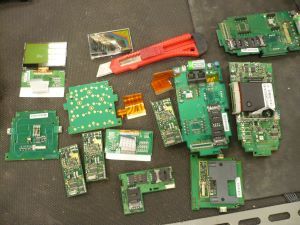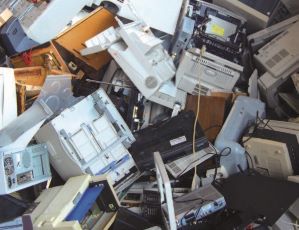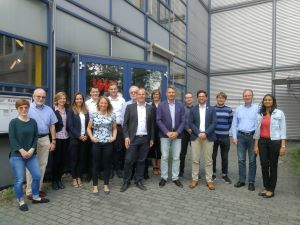The increasing production of new electronic equipment, combined with the lack of repairs, refurbishing and remanufacturing processes, leads to considerable negative environmental impacts and loss of resources. The project "EffizientNutzen" takes up this challenge and develops, based on real case studies, innovative, data-based business models for the extended product use and cascade use of electronic products.

The global challenge
The increasing amount of waste from electrical and electronic equipment and the resulting environmental problems are a global challenge. This is due to product life cycles that are too short and the continued use of linear (business) models by companies. The average use of electrical appliances is decreasing to 5 years, varying within appliance categories such as mobile phones or household appliances. As a result, global e-waste generation continues to rise, with 53.6 million tonnes in 2019 and 74.7 million tonnes of e-waste expected as early as 2030. Extending product life is one approach to addressing this situation. Ways to extend the life of products are repair and refurbishing processes. These are the focus of the Efficient Use project.

Data-based business models
Against this background, the project “EffizientNutzen” will develop innovative data-based business models for cascade use and extended product use of electronic products. This will be done by means of two central lines of action. The first strand focuses on the development of a sustainable business model for the manufacturer-neutral repair of high-quality electronic products as a service in the field of multimedia products, e.g. loudspeakers, radios, televisions, electronic toys. The second strand of action focuses on the development of business models for the take-back and, if necessary, refurbishment of electronic products for re-marketing in the context of product service systems, using the example of high-end laptops.
The repair and reconditioning processes carried out in the project, as well as the data and knowledge gained in the process, are incorporated into the development of an information portal and support the derivation of new types of business models for the circular economy. The portal realizes the offer of repaired or refurbished electronic products as a product service system as well as the marketing of the gained data and knowledge. The information portal enables an efficient exchange of information and serves as a link between the real case studies as well as between experts and external stakeholders.
Results (Status June 2022)
When designing business models for repair and recyclable remarketing solutions, the focus is on a systematic inclusion of ecological and economic aspects, including the identified barriers and challenges in the two market sectors as well as identified customer requirements.
- The market for remanufacturing lacks quality standards for buyers and thus the option of comparing offers.
- Business customers and the public sector offer great potential for remarketing business models, but there is a lack of transparency in the market.
- Repairs have a bad image: about 60 percent believe that repairs are not worth it compared to buying new.
- Consumers are willing to pay 20-40% of the price of a new appliance for repairs.
- In the repair study, it became clear that repair is only worthwhile for professional providers when the price of a new appliance is around 60 euros.
- For cheaper appliances, repair cafés and initiatives in particular offer a chance for a longer service life.
- A business idea was developed for a portal with tested instructions for professional repairers, spare parts search with prices and ordering options, and a repairer finder for end customers.

Value-added and revenue models
In the design of business models, digitalisation strategies, systems for simultaneous production and retro-production as well as networks and spare parts strategies are also included and supplemented by revenue models.
Economic and ecological impact analyses will be carried out to determine the economic viability and suitability for reducing the environmental impacts. The knowledge gained in the project will be transferred to other application domains and recommendations for the design of circular economy systems and the design of business models will be made available in the form of a guideline.
Publications
Project flyer of the funding measure (German / English) (March 2021)
The project flyers offer an insight into the contents and goals of the ReziProK projects and present first results in each case.
Project sheets of the funding measure (German) (August 2019)
The project sheets provide a brief overview of the individual projects and their goals.
Contributions to the ReziProK Transfer Conference in June 2022
Poster (German) (June 2022)
Presentation (German) (June 2022)
Picture credits: TU Braunschweig, pixabay-dokumol; TU Braunschweig
